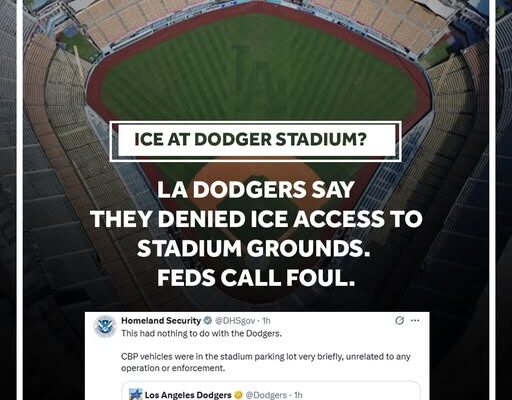LA Dodgers Deny ICE Entry to Parking Lots Amidst DHS Clarifications: A Detailed Analysis
On Thursday, the Los Angeles Dodgers announced that officers from U.S. Immigration and Customs Enforcement (ICE) had visited Dodger Stadium and requested permission to enter the stadium’s parking lots. According to the team, the Dodgers management denied this request. This incident quickly drew attention due to the high-profile nature of the Dodgers and the potential implications of federal immigration enforcement activities at such a major public venue.
However, the U.S. Department of Homeland Security (DHS) later issued a statement clarifying the situation. DHS stated that the visit by ICE officers “has nothing to do with immigration enforcement operations or any efforts targeting immigrants at Dodger Stadium.” This statement aimed to calm concerns and prevent speculation about any planned immigration raids or enforcement activities at the venue.
This report will explore the incident in depth, examining the initial report, the Dodgers’ response, the DHS clarification, and the broader context involving immigration enforcement, public venues, and community impact.
The Initial Incident: ICE Requests Access to Dodger Stadium Parking Lots
On Thursday morning, media outlets reported that ICE officers had arrived at Dodger Stadium seeking access to the stadium’s parking areas. The request was reportedly denied by Dodgers officials, who stated they had no obligation to grant access. The team’s refusal was framed as a protective action to safeguard their fans, staff, and community members.
Dodger Stadium is a prominent sports and entertainment venue in Los Angeles, serving as the home of the Los Angeles Dodgers baseball team. It attracts tens of thousands of visitors for games and other events, many of whom come from diverse backgrounds. In particular, Los Angeles is known for its large immigrant population, including many undocumented residents. As a result, the idea of ICE entering such a location sparked widespread concern among fans, community groups, and advocacy organizations.
The Dodgers’ initial statement expressed that the team prioritizes the safety and comfort of its attendees and would not cooperate with federal enforcement activities that could disrupt the event or intimidate their community.
DHS Statement: Distancing from Immigration Enforcement
Shortly after the Dodgers’ announcement, the Department of Homeland Security issued a formal response. DHS emphasized that the ICE officers’ visit was not related to immigration enforcement, and no immigration-related actions were planned or conducted at Dodger Stadium.
This clarification was aimed at addressing rumors and misinformation that had begun circulating on social media and in news reports. DHS described the visit as routine or related to other law enforcement activities that did not involve immigration enforcement.
DHS also underscored that ICE does not typically conduct immigration enforcement operations at large public venues like sports stadiums, due to safety and logistical considerations.
Context: ICE, DHS, and Public Venues
To fully understand the significance of this incident, it is important to consider the role of ICE and DHS in immigration enforcement, as well as the implications of such enforcement activities occurring at public venues.
ICE and DHS Roles
ICE is a federal agency under DHS responsible for enforcing immigration laws within the United States. Its duties include identifying, arresting, and deporting individuals who are unlawfully present or who have violated immigration regulations.
DHS, the parent agency of ICE, oversees several agencies related to national security, immigration, and border protection, including Customs and Border Protection (CBP), the Transportation Security Administration (TSA), and ICE.
Public Venues and Immigration Enforcement
Enforcement actions by ICE in public spaces have been a contentious issue. Many community groups, advocates, and local governments oppose ICE operations in locations such as schools, hospitals, places of worship, and public events. They argue that such actions create fear and deter immigrants from accessing essential services, participating in public life, or attending events.
Sports stadiums like Dodger Stadium serve as community gathering places and symbols of unity and inclusion. The prospect of ICE operations at such venues raises concerns about safety, privacy, and civil rights.
Community Reactions and Concerns
Following the announcement of ICE’s request and the Dodgers’ refusal, community leaders and immigrant rights organizations voiced support for the Dodgers’ stance.
Advocacy groups highlighted the importance of protecting vulnerable populations from what they view as aggressive immigration enforcement tactics that can lead to family separations and community destabilization.
Local officials in Los Angeles, a city known for its sanctuary policies and immigrant-friendly stance, expressed concern about potential ICE activities at community spaces, urging transparency and respect for civil liberties.
The Dodgers’ refusal was applauded as an act of solidarity with immigrant communities, reinforcing the stadium’s role as a welcoming space for all fans regardless of their background or status.
Legal and Ethical Considerations
The incident raises complex legal and ethical questions regarding the balance between federal law enforcement authority and local/community rights.
Legal Authority
ICE has broad authority to enforce immigration laws; however, private property owners or venue operators can deny access to federal agents unless presented with a warrant or legal authorization.
Whether ICE had a warrant or legal grounds to enter Dodger Stadium’s parking lots has not been publicly disclosed. Without a warrant, the Dodgers’ decision to refuse entry was legally permissible.
Ethical Implications
Ethically, the Dodgers’ choice reflects sensitivity to the social and cultural context of their fans and the broader Los Angeles community.
Allowing ICE unfettered access could have alienated many fans, undermined trust, and created a chilling effect where immigrants might avoid attending games or public events due to fear.
This ethical stance aligns with a growing movement among institutions nationwide that seek to protect immigrant communities from intrusive federal enforcement.
This incident must be viewed within the broader national immigration policy debates and enforcement trends.
Immigration Enforcement Under Recent Administrations
In recent years, immigration enforcement has fluctuated depending on federal administration priorities. Some administrations have increased deportation efforts and expanded ICE presence nationwide, while others have adopted more restrained approaches.
Public venues have largely remained off-limits for large-scale enforcement actions due to concerns over public safety and backlash.
Sanctuary Cities and Local Resistance
Los Angeles is recognized as a sanctuary city, meaning local authorities limit cooperation with federal immigration enforcement to protect undocumented residents.
The Dodgers’ stance reflects this local policy environment and the city’s values of inclusiveness and protection for immigrants.
The Dodgers organization has a history of community engagement and support for social causes, including immigration rights.
By denying ICE access, the Dodgers reinforced their role not only as a sports franchise but also as a community leader advocating for inclusion.
This move could influence other sports teams and public venues to adopt similar policies that prioritize the well-being of their communities over cooperation with federal enforcement in sensitive contexts.
While DHS denies any immigration enforcement intent, the reason for ICE’s visit to Dodger Stadium remains unclear.
Potential explanations could include:
- Routine security checks or coordination with local law enforcement for upcoming events.
- Investigations unrelated to immigration but requiring access to the parking lots.
- Gathering information or surveillance activities.
The lack of transparency has fueled speculation, but the Dodgers’ decision to protect their space was clearly communicated.
Potential Impact on Fans and Future Events
The incident has raised awareness among fans about the intersection of immigration enforcement and public life.
Some fans expressed relief and gratitude toward the Dodgers for standing against federal intrusion, while others called for more information on how venues will handle similar requests in the future.
Dodger Stadium may now serve as a model for how sports venues can navigate federal enforcement requests while maintaining trust with diverse communities.
The incident involving ICE officers requesting entry to Dodger Stadium’s parking lots, and the Dodgers’ refusal, followed by DHS’s clarification that the visit was unrelated to immigration enforcement, highlights ongoing tensions between federal immigration policies and local community values.
The Dodgers’ decision underscores the importance of public venues as safe spaces for all, regardless of immigration status, and signals a broader movement toward protecting immigrant communities from aggressive enforcement actions in everyday settings.
While unanswered questions remain about the purpose of ICE’s visit, the response from the Dodgers and DHS has brought national attention to the delicate balance between law enforcement and community trust.
As immigration remains a contentious and evolving issue in the United States, this episode illustrates how local institutions can play a pivotal role in shaping the experience and safety of immigrant populations, reinforcing that stadiums and other public spaces can be places of unity rather than fear.
If you want, I can help you further expand on any particular angle, such as detailed immigration law background, the Dodgers’ community initiatives, or reactions from advocacy groups. Just let me know!



